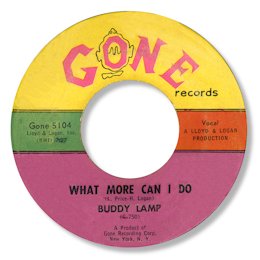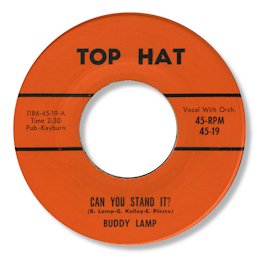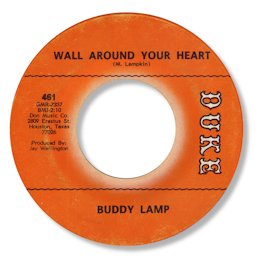 Buddy Lamp
Buddy Lamp
Willie Lee Lampkin was born in Starkville, MS and like so many of his contemporaries moved to Detroit while he was growing up. He is a familiar name to fans of the music of that city, but not so well appreciated elsewhere. And this view needs to be modified as he was a highly gifted singer with fire in his belly and grit in his soul – one of the least heralded vocalists of the 60s. And a good songwriter to boot. Like many others his debt of gratitude to Bobby “Blue” Bland was considerable but that’s hardly a problem for me or other Bland obsessives.
His first recordings were gospel ones made in Detroit under his own name, with the Lampkin Singers, and as the “Son Of Thunder” with the Violinaires – a most appropriate name for a guy blessed with his earthshaking baritone. His first secular sessions were held in New York, however, for Harold Logan and Lloyd Price. They leased a couple of tunes to George Goldner, one of which was the fine blues ballad ![]() What More Can I Do on which Lamp shows off his chops with more than a nod of recognition to Bobby Bland – check out his great growling finish. The similarly styled “I’m Coming Home”, his first version of this tune, is equally memorable. His second Peanut release coupled the easy paced R & B of “Insanity” with an excellent
What More Can I Do on which Lamp shows off his chops with more than a nod of recognition to Bobby Bland – check out his great growling finish. The similarly styled “I’m Coming Home”, his first version of this tune, is equally memorable. His second Peanut release coupled the easy paced R & B of “Insanity” with an excellent ![]() Too Late – fine churchy piano/organ combination. These Peanut releases were also the work of Logan and Lloyd.
Too Late – fine churchy piano/organ combination. These Peanut releases were also the work of Logan and Lloyd.
 His one off for ABC wasn’t in this league sadly despite Lamp’s valiant attempts to get into Chuck Jackson’s skin, but his Logan/Lloyd 45 for their Double L label - possibly from Buddy's earlier sessions with them - was right back to his best. “My Tears” was really tough R & B with Lamp at his gruff best over a cooking band (excellent horns) and some female assistance. This form continued on the rare Top Hat 45, both sides of which were straight out of the Bland songbook. This was his first Detroit recording. The bluesy ballad “Sad Music” featured some fine guitar, while the upbeat
His one off for ABC wasn’t in this league sadly despite Lamp’s valiant attempts to get into Chuck Jackson’s skin, but his Logan/Lloyd 45 for their Double L label - possibly from Buddy's earlier sessions with them - was right back to his best. “My Tears” was really tough R & B with Lamp at his gruff best over a cooking band (excellent horns) and some female assistance. This form continued on the rare Top Hat 45, both sides of which were straight out of the Bland songbook. This was his first Detroit recording. The bluesy ballad “Sad Music” featured some fine guitar, while the upbeat ![]() Can You Stand It had perhaps a more expressive Buddy vocal.
Can You Stand It had perhaps a more expressive Buddy vocal.
Buddy's next 45s moved him into more obvious soul territory, and form the basis of his reputation as a Motor City vocalist. He worked for the famous Mike Hanks who released Lamp’s tracks on D-Town and Wheelsville – and who thankfully recognised that there wouldn’t be any point in smothering Lamp in sub-Motown arrangements. Every one of the tracks he cut for Hanks gets 5 stars from me – hard as you want to be. “Next Best Thing” was a catchy mid paced tune that the dancers like, but despite his Bland like squalls at the end of it, his vocals were more assured on the brilliant ![]() Just A Little Bit Of Lovin’. His initial Wheelsville single was more of the same – roaring vocals over some hard hitting Motor City rhythms. It’s possible that Lamp’s vocals on the fine “You’ve Got That Lovin’ Touch” were cut at Willie Mitchell’s, but it’s a certainty that the funky “Confusion” was cut there. And it’s a dollar to a penny that it’s the Memphis Horns behind him on the uptempo pounding “Save Your Love” – wonderful Otis R “gotta gotta” phrases he howls out.
Just A Little Bit Of Lovin’. His initial Wheelsville single was more of the same – roaring vocals over some hard hitting Motor City rhythms. It’s possible that Lamp’s vocals on the fine “You’ve Got That Lovin’ Touch” were cut at Willie Mitchell’s, but it’s a certainty that the funky “Confusion” was cut there. And it’s a dollar to a penny that it’s the Memphis Horns behind him on the uptempo pounding “Save Your Love” – wonderful Otis R “gotta gotta” phrases he howls out.
 Lamp moved to Duke in 1968, in the company of his backing group the Lamp Sisters, no doubt courtesy of Willie Mitchell at whose studios he continued to record in combination with GM in Detroit.
Lamp moved to Duke in 1968, in the company of his backing group the Lamp Sisters, no doubt courtesy of Willie Mitchell at whose studios he continued to record in combination with GM in Detroit. ![]() I’m Coming Home is easily my favourite version of the song - super vocals of course and the playing of the Hi guys is immaculate for sure. The funky little “Where Have You Been” is well up to standard too. But his best Duke track for me is the superb
I’m Coming Home is easily my favourite version of the song - super vocals of course and the playing of the Hi guys is immaculate for sure. The funky little “Where Have You Been” is well up to standard too. But his best Duke track for me is the superb ![]() Wall Around Your Heart which is the nearest thing to a Bland outtake imaginable – excellent vocal from Mr Lamp in a setting by Jay Wellington that owes everything to Joe Scott. “Hen Pecked” is the classic Hi sound of the period, full of good things like the pianist’s riffs and the full horn section, over which Lamp is at his throaty best. And that was his final 45 from the Golden Age.
Wall Around Your Heart which is the nearest thing to a Bland outtake imaginable – excellent vocal from Mr Lamp in a setting by Jay Wellington that owes everything to Joe Scott. “Hen Pecked” is the classic Hi sound of the period, full of good things like the pianist’s riffs and the full horn section, over which Lamp is at his throaty best. And that was his final 45 from the Golden Age.
Sadly Lamp’s later recordings do nothing for me at all – the magic had gone to be replaced by boring disco rhythms and vocals that are far too restrained.
 |
 |
 |
UPDATE ~ I am delighted to say that Bob Lampkin has been in touch. He writes to say that "Thank you for honoring my grandfather. He just passed a few years ago. It is a real joy to hear his voice again. One correction though, The Lamp Sisters are indeed my great aunts. Winnie English is one of my favorite aunts and still lives in Detroit." I have written to Bob asking for any more info he might have on his family. If he replies I wil update this page again.
Note ~ "Confusion" and "You Got That Loving Touch" can be found on the Soul-Tay-Shus CD "Northern Souljers Meet Hi Rhythm".